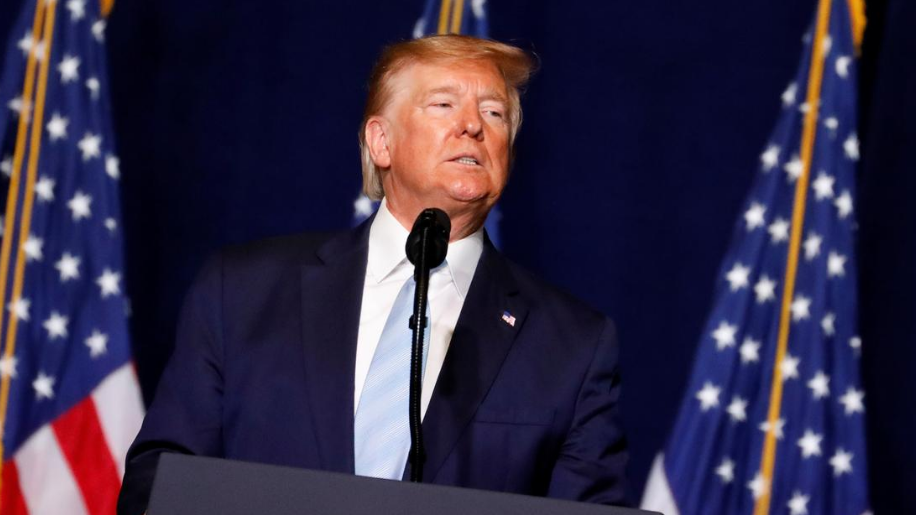
U.S. President Donald Trump makes a speech to evangelical supporters in Miami, Florida, U.S., January 3, 2020. /Reuters Photo
U.S. President Donald Trump makes a speech to evangelical supporters in Miami, Florida, U.S., January 3, 2020. /Reuters Photo
U.S. President Donald Trump warned in a tweet on Sunday that the U.S. is targeting 52 sites in Iran and will hit them "very fast and very hard" if the Islamic Republic of Iran attacks American personnel or assets.
"The USA wants no more threats!" Trump said, adding that the 52 targets represented the 52 Americans who were held hostage in Iran after being seized at the U.S. embassy in Tehran in 1979.
Trump also warned on Saturday night that the United States would hit Iran harder than ever before if Tehran retaliates to the assassination of one of its top generals.
His latest response came after the assassination of Iranian Major-General Qasem Soleimani in a U.S. airstrike on Baghdad airport on Friday morning.
U.S. Secretary of State Mike Pompeo defended on Sunday the U.S. air strike that killed Soleimani, saying intelligence made clear taking no action against the military leader would have posed a greater risk.
"The intelligence assessment made clear that no action – allowing Soleimani to continue his plotting and his planning, his terror campaign – created more risk than taking the action that we took last week," Pompeo said in an interview on ABC's "This Week."
A thorn in the side of both the U.S. and Israel since the 1980s, Soleimani rose through the ranks of Iran's military to take charge of the Revolutionary Guard's elite Quds Force, the main arm of Iran's extraterritorial campaigns. He would go on to be described by Iran's Supreme Leader Ayatollah Ali Khamenei as a "living martyr of the revolution."
03:43
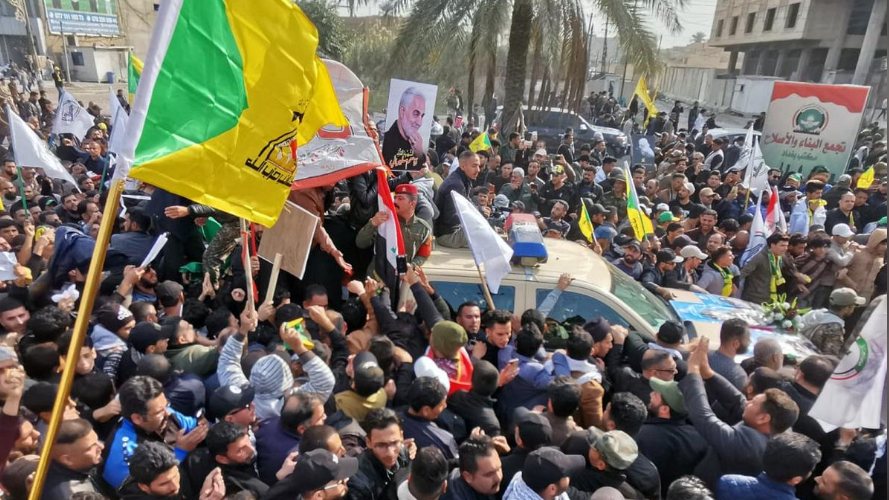
Tensions have been rising with Tehran vowing to avenge the death of Soleimani and the U.S. is deploying some 3,500 additional troops to the Middle East region to boost security.
Read more:
Pompeo: Strike on Iranian commander in response to imminent attack
Iranian Supreme Leader Ayatollah Khamenei on Friday appointed Esmail Ghaani as the new commander of the Quds Force of Islamic Revolution Guards Corps (IRGC).
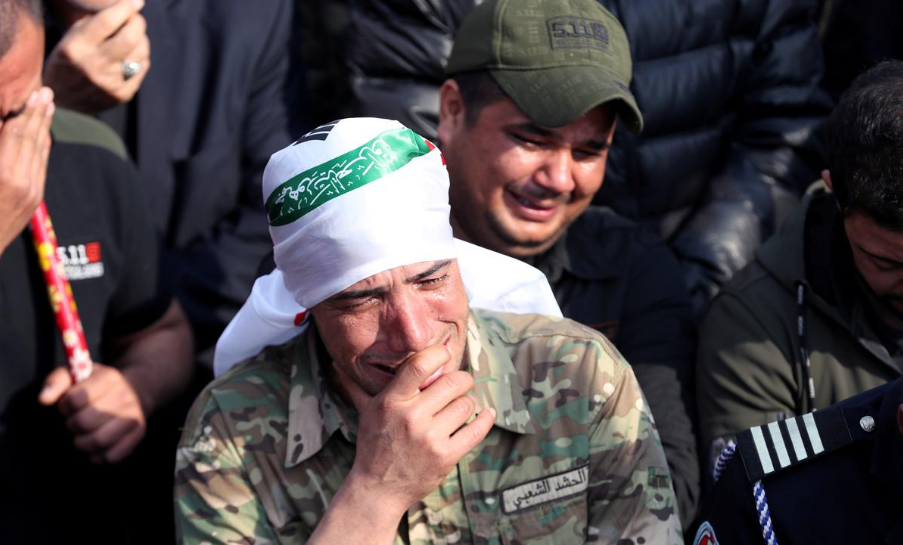
A man mourns at the funeral of the Iranian Major-General Qasem Soleimani, and the Iraqi militia commander Abu Mahdi al-Muhandis, who were killed in an airstrike at Baghdad airport, in Baghdad, Iraq, January 4, 2020. /Reuters Photo
A man mourns at the funeral of the Iranian Major-General Qasem Soleimani, and the Iraqi militia commander Abu Mahdi al-Muhandis, who were killed in an airstrike at Baghdad airport, in Baghdad, Iraq, January 4, 2020. /Reuters Photo
Here's how the world is reacting to the killing:
EU
European Union foreign policy chief Josep Borrell on Saturday stressed the "need for de-escalation" after the attack.
"Spoke w[ith] Iranian FM @JZarif about recent developments. Underlined need for de-escalation of tensions, to exercise restraint & avoid further escalation," he tweeted.
Borrell said he also discussed importance of preserving the Joint Comprehensive Plan of Action (JCPOA), which remains crucial for global security, with Zarif.
According to an EU release issued on Sunday, Borrell has invited Zarif to Brussels to "continue their engagement on these matters."
Iraq
Iraq's Ministry of Foreign Affairs on Sunday summoned U.S. ambassador Matthew Tueller to condemn American strike on Iraq that killed a top Iranian general, an Iraqi commander and other local fighters.
"They were a blatant violation of Iraqi sovereignty," the ministry said in a statement, and "contradict the agreed-upon missions of the international coalition."
The Iraqi parliament is also holding an extraordinary session on Sunday that lawmakers said they would use to push for a vote on a resolution requiring the end of the presence of foreign troops.
Iraqi Prime Minister Adel Abdul Mahdi urged parliament on Sunday to take urgent measures and end the foreign troop presence as soon as possible.
"Despite the internal and external difficulties that we might face, it remains best for Iraq on principle and in practically," Abdul Mahdi told parliament in a speech.
China
Chinese State Councilor and Foreign Minister Wang Yi said China is highly concerned about the current situation in the Gulf and opposes the excessive use of force in international relations during a phone call with Russian Foreign Minister Sergei Lavrov on Saturday.
Read more:
China, Russia oppose abuse of force in international relations
China maintains that all parties should earnestly abide by the purposes of the UN Charter and the basic norms governing international relations, that Iraq's sovereignty, independence and territorial integrity should be respected, and peace and stability in the Middle East and the Gulf region should be maintained, Wang noted.
Echoing Wang's stance on the issue, Lavrov said U.S. actions violate international law and should be condemned.
Russia
In a phone call on Saturday, Russian Foreign Minister Sergei Lavrov expressed condolences over the killing of Soleimani to his Iranian counterpart.
Lavrov said the killing of the Iranian major general had violated fundamental international law.
"The ministers emphasized that U.S. actions are a gross violation of fundamental international law and do not contribute to finding solutions to the complex problems that have accumulated in the Middle East, but lead to a new round of escalation of tension in the region," the Russian Foreign Ministry said in a statement.
Israel
Israeli Prime Minister Benjamin Netanyahu on Sunday praised the United States for killing Soleimani, saying Israel stands "completely on the side of the U.S." in its current military campaign in the Middle East
"Soleimani initiated, planned and executed many terrorist attacks throughout the Middle East and beyond," Netanyahu told his weekly cabinet meeting.
U.S. President Donald Trump "deserves every appreciation" for ordering the killing of Soleimani, Netanyahu added.
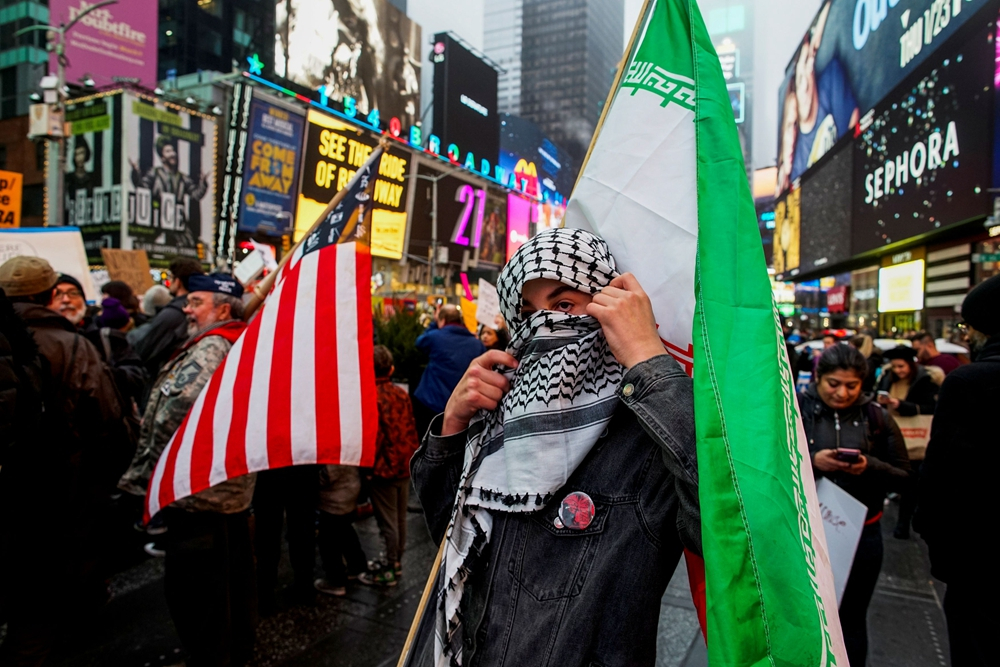
A man covers his face as people take part in an anti-war protest amid increased tensions between the United States and Iran at Times Square in New York, U.S., January 4, 2020. /Reuters Photo
A man covers his face as people take part in an anti-war protest amid increased tensions between the United States and Iran at Times Square in New York, U.S., January 4, 2020. /Reuters Photo
France
France stepped up diplomatic initiatives on Saturday to ease tensions. French President Emmanuel Macron talked with Iraq President Barham Salih, Macron's office said.
"The two presidents agreed to remain in close contact to avoid any further escalation in tensions and in order to act to ensure stability in Iraq and the broader region," a statement from Macron's office said.
Macron also spoke with the de facto ruler of the United Arab Emirates, Abu Dhabi Crown Prince Sheikh Mohammed bin Zayed al-Nahyan.
Gholamali Abuhamzeh, a senior commander of the Revolutionary Guards, said Tehran would punish Americans "wherever they are in reach", and raised the prospect of possible attacks on ships in the Gulf.
Read more:
Anger, fear mount after U.S. killing of Iranian top general
From coup to Soleimani's assassination: Seven decades of U.S.-Iran relations in pictures
Germany
According to Bild am Sonntag newspaper, German Foreign Minister Heiko Maas will seek direct talks with Iran to try to de-escalate the tensions.
"In the coming days, we will do all we can to counteract a further escalation of the situation-in the United Nations, the EU and in dialogue with our partners in the region, including in talks with Iran," Maas told the Bild am Sonntag newspaper on Saturday.
German Defence Minister Annegret Kramp-Karrenbauer, Chancellor Angela Merkel's protege and would-be successor, said in a statement that it was up to Iran's leaders to make sure that the conflict in the region did not escalate further.
Britain
British Foreign Minister Dominic Raab said on Sunday he had spoken to Iraq's prime minister and president to urge de-escalation of tensions in the region.
Raab, who described Soleimani as a "regional menace" and said he was sympathetic to the situation the United States found itself in, said he also planned to speak to Iran's foreign minister.
"There is a route though which allows Iran to come out of the international cold," he told Sky News. "We need to contain the nefarious actions of Iran but we also need to deescalate and stabilize the situation."
Asked if Soleimani's killing was legal, Raab said, "There is a right of self defense."
02:09
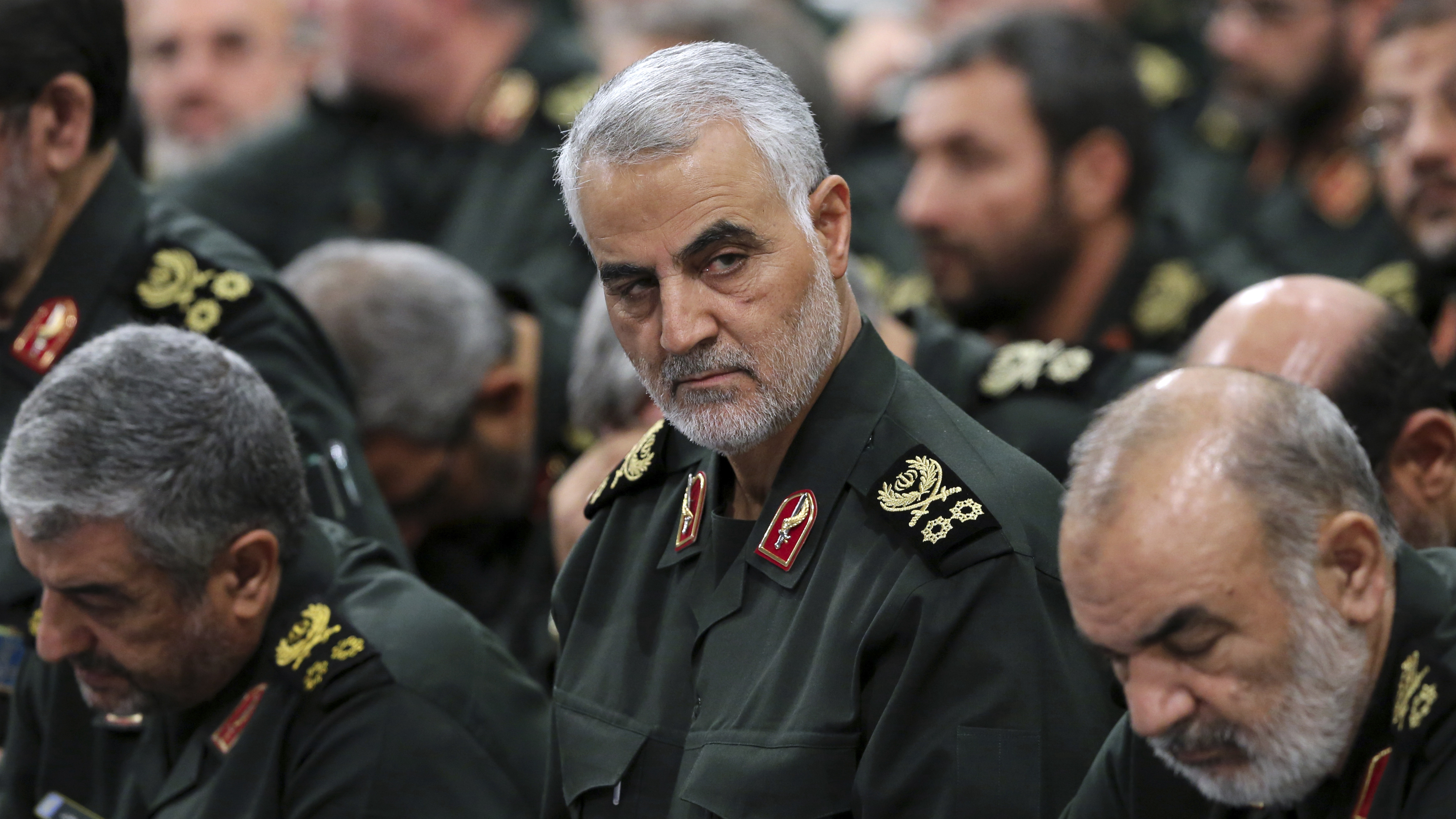
'Revenge is not a strategy'
On escalating U.S.-Iran tensions, Barbara Slavin, director of the Future of Iran Initiative at the Atlantic Council believes "revenge is not a strategy" as she didn't think the Trump administration considered the consequences of its actions.
"He (Soleimani) is a controversial figure but this is not the point," Slavin told CGTN during a televised debate.
However, Kaveh Afrasiabi, author and Iranian affairs analyst, expressed sharply different opinions, as he believed Soleimani is a "national hero."
(Cover: Iranian demonstrators protest against the killing of Iranian Major-General Qasem Soleimani in Tehran, Iran, January 3, 2020. /Reuters Photo)
(With input from agencies)